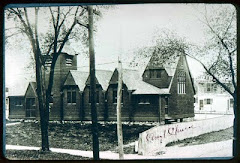When Christmas falls on a Sunday…
Many churches, finding that Christmas falls on a Sunday this year, are choosing to scale back their services or even cancel them in light of the holiday.
“This is a consumer mentality at work: ‘Let’s not impose the church on people. Let’s not make church in any way inconvenient,’” offered David Wells, professor of history and systematic theology at Gordon-Conwell Theological Seminary. “I think what this does is feed into the individualism that is found throughout American culture, where everyone does their own thing.”
Fuller Theological Seminary professor Robert K. Johnston worries that another Christmas tradition is fading. “What’s going on here is a redefinition of Christmas as a time of family celebration rather than as a time of the community faithful celebrating the birth of the Savior. There is a risk that we will lose one more of our Christian rituals, one that’s at the heart of our faith.” Ben Witherington III, professor of New Testament interpretation at Asbury Theological Seminary, called it a “capitulation to narcissism.”
It didn’t help that some of the megachurch spokespersons gave less than helpful answers as to why, such as the desire to cater to the family (which could hold true on any other Sunday as well), or simply to be “lifestyle-friendly,” which positions them to charges of wholesale capitulation to culture. Even worse was the response that church services would be cared for through DVD’s, which is jolting to anyone with even the barest of theological sensitivities to the doctrine of the church and its worship.
But somebody needs to call “time-out” for a minute, because neither side is getting this one right. The critics are being too quick on the draw, and the reasoning offered by the churches cancelling their services isn’t what best validates their choice.
First, evangelical churches of all kinds throughout the United States have seldom held services on Christmas Day even when it has not fallen on a Sunday (a tradition that dates back to the Puritans).
Second, marking Christmas has never been tied to a Sunday-specific celebration (as with Easter). If there is a day that has uniformly been seized by churches to celebrate the birth of Christ, it has been Christmas Eve - and the large churches being chastised for not having Sunday services on the 25th are planning on offering numerous services on the 24th.
Third, it is not simply the megachurches who are doing this – churches of all types are, at the very least, scaling back their service offerings for the 25th (so making this about a megachurch or seeker-targeted sellout is unfair).
Finally, some of the rhetoric criticizing churches for opting out of services on the 25th skates dangerously close to Sabbatarianism, with a fair dose of legalism to boot. To insist that we must meet on a Sunday – any Sunday – can be debated. Early church records show a preference for worship on the “Lord’s Day,” but only the second-century church manual, the Didache, directed Christians to meet at that time. No day was set aside in Gentile Christianity for worship until the time of Constantine and the institutionalization of the church, but nowhere is it directly commanded in Scripture.
So are we admonished to gather together as believers? Yes. But not necessarily on a Sunday morning.
For many years, Christmas Eve has been the day of choice for the communal celebration among Christians of the birth of Christ. Celebrations could be held on Christmas Day, but very few would come. If one cares about leading the church to celebrate the birth of Christ, they should go with the hundreds or even thousands that can assemble on Christmas Eve against the handful they might be able to engage on Christmas Day - particularly since there is the biblical freedom to do so.
This isn’t compromise; it is common sense. But it is a moot point for most churches. The volunteer base needed for a Christmas Day service simply cannot be met. As I joked with one reporter, the critics who want to insist on a Christmas Day service have no intention of being the one sitting in the nursery watching someone else’s child. They may not have any intention of attending at all. I recall a deacon in the church I pastored while in seminary insisting on a Sunday night service on Super Bowl Sunday. We had the service; he stayed home to watch the Super Bowl.
The larger issue, of course, is how best to address the valid cultural concerns expressed by individuals such as Wells, Johnston and Witherington, who are well-intentioned and justifiably concerned about the world in which we live and what it might be doing to the church.
My contention is that they have the right description of a cultural malady (materialism, individualism, consumerism), but the wrong diagnosis (that it is demonstrated by whether you go to church on December 24 vs. December 25), and have certainly applied it to the wrong patient (the churches choosing to scale back or cancel on the 25th) – which makes their prescription all the more ineffective (to fight the culture war, we should have services on the 25th).
We will not keep Christ in Christmas through a Christmas Day service, whether on a Sunday or any other day of the week. We will keep Christ in Christmas by working to keep His birth in the center of our hearts and celebrations (as Christmas Eve services will most certainly do).
We will keep Christ in Christmas by avoiding the materialism our culture places upon the holiday season.
We will keep Christ in Christmas most of all by reaching out to individuals within our culture for Christ so that one day they may celebrate His birth with us.
Whenever it is we meet to do it.
-James Emery White







